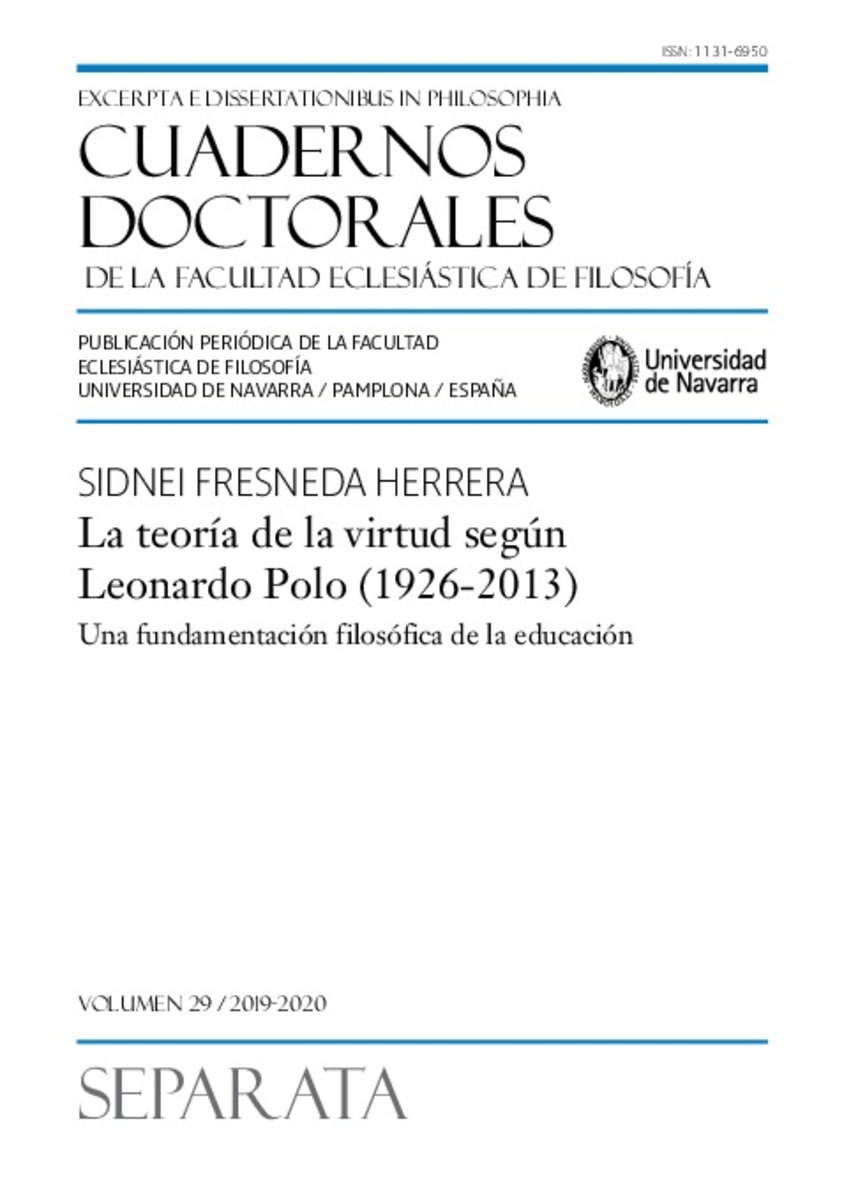Full metadata record
| DC Field | Value | Language |
|---|---|---|
| dc.creator | Fresneda-Herrera, S. (Sidnei) | - |
| dc.date.accessioned | 2020-09-10T11:22:38Z | - |
| dc.date.available | 2020-09-10T11:22:38Z | - |
| dc.date.issued | 2020-09-10 | - |
| dc.identifier.citation | Fresneda-Herrera, S. (Sidnei). "La teoría de la virtud según Leonardo Polo (1926-2013). Una fundamentación filosófica de la educación". Cuadernos Doctorales de Filosofía. Excerpta e dissertationibus in Philosophia. 29, 2019, 5 - 97 | es |
| dc.identifier.issn | 1131-6950 | - |
| dc.identifier.uri | https://hdl.handle.net/10171/59346 | - |
| dc.description.abstract | Son constantes las reformas en los sistemas educativos y muchas veces llevan al desconcierto muchos educadores porque no ven sentido en ellas. En este trabajo buscamos mostrar presupuestos antropológicos para posibles reformas, siempre necesarias por la forzosa contingencia de las prácticas educativas. Todo cambio en la tarea educativa solo es válido desde que se parta de una buena comprensión filosófica del ser humano y de la educación. Como soporte de la argumentación utilizamos la antropología de Leonardo Polo por su carácter rico y sugerente. Este filósofo interpreta la labor educativa como ayuda al crecimiento humano que sólo es posible por la adquisición de hábitos. En este trabajo describimos como el descubrimiento clásico de la noción de virtud fue relegado por el pensamiento moderno y en nuestros días sigue siendo olvidado. Pero, nosotros defendemos que la educación en virtudes debe ser retomada porque permite al que la tiene una visión más profunda de la realidad e integra armónicamente todas las dimensiones del ser humano. La educación por competencias es la teoría pedagógica más común en nuestros días y contiene muchos aspectos positivos que permiten alcanzar buenos resultados. Sin embargo, defendemos que educar en virtudes es mucho más rico que alcanzar resultados exteriores porque perfeccionan al ser humano desde dentro una vez que refuerza todas sus potencias: inteligencia, voluntad y afectividad. Además, la virtud es condición necesaria para que uno pueda aportar novedades desde su libertad personal. | es_ES |
| dc.description.sponsorship | Reforms in educational systems are constant and they often lead educators to confusion because they do not see sense in them. This work seek to show anthropological assumptions for possible reforms, always needed due to the forced contingency of educational practices. Any change in education is valid as long as it is based on a good philosophical undestanding of human being and its development. The study is based on Leonardo Polo’s anthropology, that is very rich and suggestive about the theme. This philosopher interprets educational work as aid to human development, being possible only by the acquistion of habits. This work describes how the classical understanding of virtue was relegated by modern thought and it is still forgotten today. Here is argued that education in virtues must be retaken. It allows a deeper view of reality and it integrates harmoniously all the dimensions of human being. Nowadays competency-based education is the most common pedagogical theory. It has a lot of positive aspects and achieves good results. However, this study maintains that classical virtues education is richer than that one. Classical virtues education prepare the human being integrally, so that he is truly human, that is to say, they form from within so that his life is well lived, reinforcing intelligence, will and affectivity of human being. The other is external and refers to action and mainly seeks the success of the process, without taking into account the learner or the educational process itself. In addition, virtue is a necessary condition for one to be able to bring new facts to the enviroment through his personal freedom. | es_ES |
| dc.language.iso | spa | es_ES |
| dc.publisher | Servicio de Publicaciones de la Universidad de Navarra | es_ES |
| dc.rights | info:eu-repo/semantics/openAccess | es_ES |
| dc.subject | educación | es_ES |
| dc.subject | virtud | es_ES |
| dc.subject | competencia | es_ES |
| dc.subject | antropología | es_ES |
| dc.subject | education | es_ES |
| dc.subject | virtue | es_ES |
| dc.subject | competition | es_ES |
| dc.subject | anthropology | es_ES |
| dc.title | La teoría de la virtud según Leonardo Polo (1926-2013). Una fundamentación filosófica de la educación | es_ES |
| dc.type | info:eu-repo/semantics/article | es_ES |
| dc.publisher.place | Pamplona | es_ES |
| dadun.citation.endingPage | 97 | es_ES |
| dadun.citation.publicationName | Cuadernos Doctorales de Filosofía. Excerpta e dissertationibus in Philosophia | es_ES |
| dadun.citation.startingPage | 5 | es_ES |
| dadun.citation.volume | 29 | es_ES |
Files in This Item:
Statistics and impact
Items in Dadun are protected by copyright, with all rights reserved, unless otherwise indicated.






